Coronavirus Australia live news: Covid recovery needs private investment, says Macquarie chief Shemara Wikramanayake
Macquarie CEO Shemara Wikramanayake says governments need private money to help recover from the pandemic and to fund the projects needed to prevent a repeat.
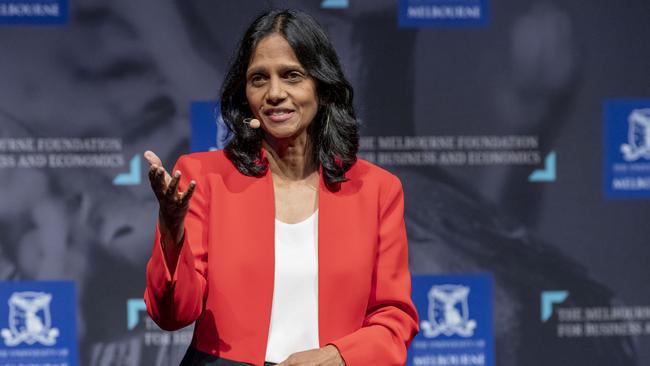
- CHO apologises for singling out Afghan families
- Victoria on track for easing as cases fall
- Trump vows ‘vaccine for all’ by April
- Five families behind new cluster
- Type-O blood at less risk from virus
Welcome to our rolling coverage of the continuing coronavirus pandemic. As Victoria’s daily case numbers drop to 21, anti-lockdown protesters have moved planned rallies from the CBD to suburbia to avoid police.
AFP 9.05pm: UN to celebrate 75th anniversay amid pandemic
The United Nations will mark its 75th anniversary Monday, celebrating the mantra that “multilateralism is not an option but a necessity,” even as the coronavirus underscores the fragility of international cooperation.
The anniversary will kick off the global body’s annual General Assembly, when normally the leaders and representatives of nearly 200 countries gather en masse to sound off about the world’s problems and offer myriad solutions.
But this year, a part of Manhattan will not be sealed off for the “UNGA”; there will be no endless limousine convoys, and no busy beehive of diplomats, journalists and translators in the halls of the UN.

Instead, with Covid-19 still limiting global movement, just one representative from each of the 193 UN members will be allowed, and only someone already in the United States.
Everyone else will have to appear by videoconference, including some 160-170 heads of state and government planning addresses.
Appearing by video on Tuesday will be Russia’s Vladimir Putin and China’s Xi Jinping, who in the past have let their top diplomats speak for them; and US leader Donald Trump.
Read more: States fight Malcolm Turnbull’s UN torture deal
AFP 8.35pm: Californian wifi vans connect disadvantaged students
A minivan with a Wi-fi router attached to the dashboard and a satellite antenna on the roof is helping 200 disadvantaged students in Santa Ana, close to Los Angeles, cope with the rigors of distance learning during the coronavirus pandemic.
“When the school district launched the new school year last month, some of the parents had challenges,” said Roman Reyna, who is overseeing the “Wi-fi on wheels” project launched by JFK Transportation, which organizes school runs in the district.

“A lot of our students don’t have access to Wi-fi. So it’s difficult for them to hear some of the messages or learning lessons behind the computer,” Reyna said.
As many schools began the year with teaching online, the head of the company, Kevin Watson, came up with the idea of equipping some of his vans with internet relays and parking them at strategic points in the city where students with no Internet at home can stay on top of their school work.
“We park the van, and we’re here about eight hours to ensure that the students are connected during the day,” Watson said. “The Wi-fi signal will reach approximately three and a half football fields, that’s about 350 yards (350 meters).” The connection is secured via a password and accessible only to students, he added.
Read more: Lessons we can learn to help schools support our children
Cliona O’Dowd 7.35pm: To be pandemic proof, we need private investment
The coronavirus pandemic will accelerate private investment in public infrastructure, Macquarie managing director and chief executive Shemara Wikramanayake has suggested, with investment in renewables, health and digital infrastructure just some of the areas the private sector is eyeing up in a post-COVID-19 world.
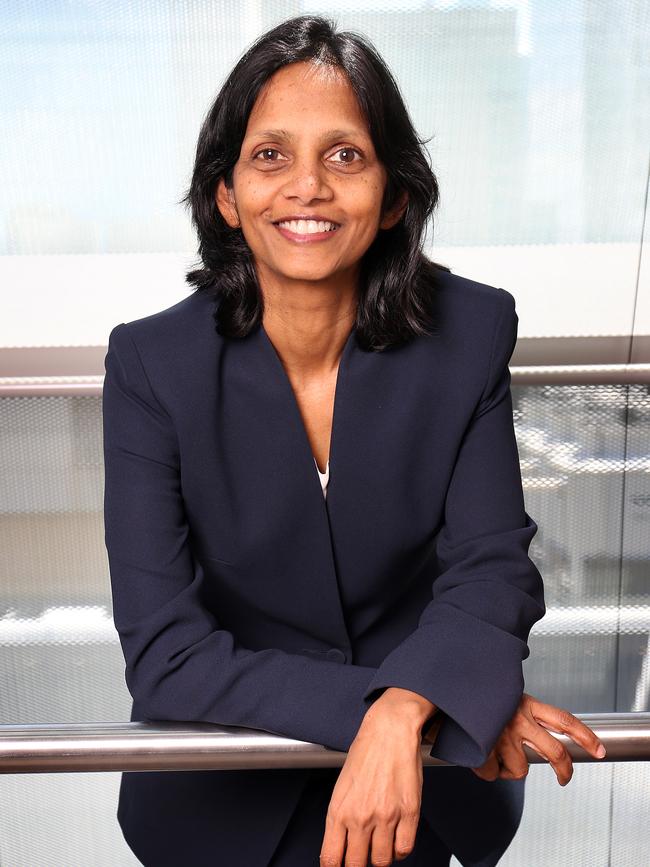
Speaking at an Infrastructure Partnerships Australia event on Friday, Ms Wikramanayake said the level of fiscal debt taken on by both state and federal governments through the crisis, as well as the need to keep infrastructure projects going, would push the government to bring in more private capital to support jobs and the economy in the coming years.
“The immediate response has been very good in terms of helping the economy and keeping it active through the pandemic but as we come out of this there’s going to be even more need for the government to bring capital to infrastructure projects to keep driving jobs and stimulate the economy.
“They’re going to come out of this with much greater fiscal debt at all levels. So they’re going to need more private sector money coming in for things like the ongoing transition to renewables. Renewables in 2012 were providing 10 per cent of our capacity, by 2019 it was 22 per cent and now at times we’re relying 50 per cent on renewables. So all of these transitions are going to need support.”
Read the full story here.
Patrick Commins 6.40pm: Dissent over timing of job hunt contract
Business groups have backed the government’s decision to ramp up mutual obligation requirements for jobseekers, but labour market experts have warned the changes may be premature given expectations that unemployment will continue to rise.
Mutual obligation requirements and associated penalties were suspended earlier this year as the COVID-19 crisis threw hundreds of thousands of Australians out of jobs. The government is now phasing these obligations back in.
Scott Morrison announced on Thursday that from the end of the month those receiving unemployment benefits would be required to apply for eight jobs each month, up from four.
There will also be the return of penalties, including the suspension of payments for those who do not meet the obligations. Victoria remains exempt.
Australian Chamber of Commerce and Industry director of skills and employment Jenny Lambert said toughening the rules was “an appropriate response in the short term”. “It is important that the mutual obligation requirements for JobSeeker recipients rise in line with employment opportunities,” she said.
Council of Small Business Organisations Australia chief executive Peter Strong agreed, saying “nobody gets money for nothing”.
Continue reading here.
AFP 6.10pm: Canada opposition leader O’Toole tests positive
Canada’s conservative opposition leader Erin O’Toole tested positive for the new coronavirus on Friday, his office announced, one day after another federal party leader did, too.
Both O’Toole and Bloc Quebecois leader Yves-Francois Blanchet were “feeling well” and were self-isolating, according to statements.
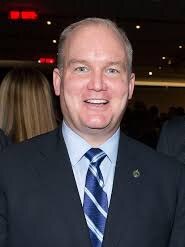
Each had had close contact with staffers who tested positive for the Covid-19 illness.
O’Toole said he is “very relieved that his wife and children have tested negative.” The diagnoses come just one week before Prime Minister Justin Trudeau’s minority Liberal government is to test support in parliament for a new agenda-
Read more: Canadians may revive Ampol bid
AFP 5.40pm: Rio reopens stadiums to take heat from beaches
Rio de Janeiro on Friday authorized football fans to return to stadiums from October 4, after a six-month hiatus for the coronavirus pandemic, which continues to batter Brazil.
“Rio city hall announces the return of fans to stadiums,” the city said in a statement.
“They will be required to wear protective masks and undergo temperature checks at the entrance. Ticket sales will be online to avoid crowds.” The decision still needs a green light from the Brazilian Football Confederation (CBF).
Rio authorities had initially announced in June they would allow fans back into stadiums from July 10, but quickly backtracked as the pandemic surged.

Mayor Marcelo Crivella said the city would allow up to 20,000 fans at the first match, to be played at the legendary Maracana stadium between Flamengo and Athletico Paranaense.
“We’re going to call on the CBF to make Maracana stadium an alternative to the beach. Today, perhaps the biggest problem Rio faces are the big crowds of people with no masks at the beach,” he told journalists.
“We can allow up to 20,000 people. Maybe that will be 20,000 less people at the beach.” The attendance figure, one-third of the venue’s capacity, is high compared to what authorities elsewhere in the world have allowed for the first post-lockdown matches with fans -- 5,000 in France, 2,500 in Britain, 300 in Germany, for example.
It is on a par with what the NFL’s Dallas Cowboys allow at games -- but with their stadium only one-fourth full.
Brazil had the second-highest death toll in the pandemic, after the United States, with nearly 136,000 people killed.
Read more: India passes Brazil to become the world’s second Covid capital
Anthony Piovesan 5.10pm: 16 arrested, 21 fined at Freedom Day rally
Anti-lockdown protesters moved a rally from Melbourne’s CBD to a suburban park and then the beach in a bid to avoid police but more than a dozen have been arrested for coronavirus breaches.
Organisers instructed the few protesters who arrived at the Victorian State Library in Melbourne’s CBD to head to Elsternwick Park in Brighton due to a heavy police presence at the original location.
Up to 16 people were arrested and 21 people were fined for gathering in the Elsternwick area in a “blatant breach” of state’s coronavirus directions, Victoria Police said in a statement on Saturday afternoon.

“We are frustrated that these people continue to put the lives of Victorians at risk,” it reads.
Most of the arrests were for breaching the Chief Health Officer directions and refusing to provide name and address.
Up to 100 people attended the “Freedom Day” rally but many splintered into smaller groups and headed to the foreshore and several marched down Ormond Esplanade
Read the full story here.
Patrick Commins 4.30pm: The regions hardest hit by the Covid recession
Mandurah in southwest Western Australia has suffered the biggest rise in unemployment in the country through the COVID-19 recession, analysis of data by The Australian reveals.
The statistical area south of Perth suffered a 12 percentage point increase in its jobless rate to 18 per cent over the year to July — the biggest hit among the 87 Australian regions included in the Australian Bureau of Statistics labour force data.
The next biggest lift in the jobless rate was found in Sydney’s inner west, where unemployment spiked to 9.4 per cent in July: eight percentage points higher than a year before.
As Scott Morrison on Friday announced that the national cabinet had tasked its rural and regional subcommittee with developing a plan to increase jobs outside the major cities, a new Reserve Bank of Australia research paper found regions that suffer the biggest blow to employment during recessions had “significantly higher unemployment rates for around a decade afterwards”.
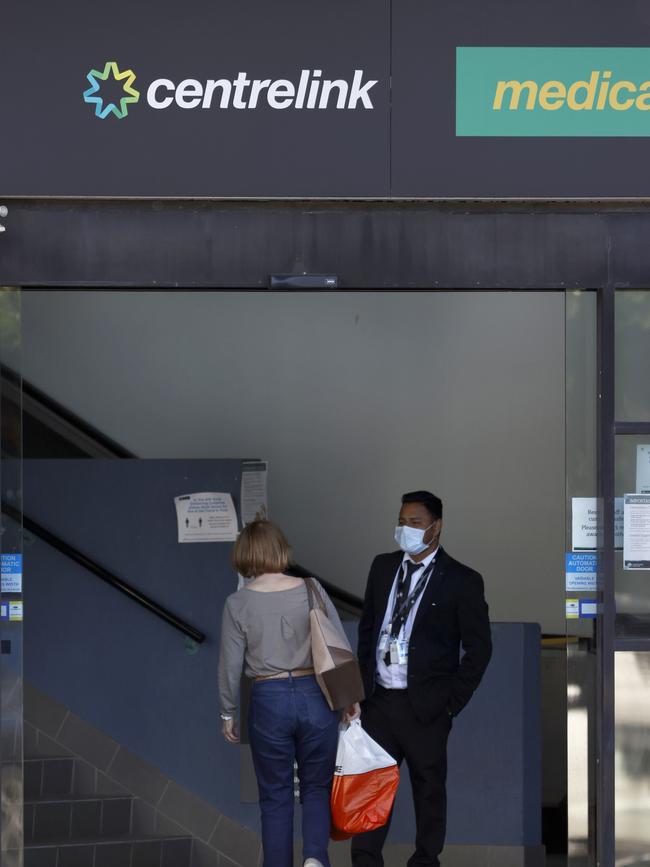
While the focus has been on the national experience, the RBA report said a regional approach presented a more meaningful way of assessing the impact and potential long-lasting effects of a recession on workers.
The ABS figures showed the Coffs Harbour and Grafton statistical area in NSW, North West Melbourne and Wide Bay in Queensland rounded out the five hardest-hit regions.
Read the full story here.
Oliver Wright 4pm: Britons warned to prepare for hundreds of daily deaths
British Prime Minister Boris Johnson is preparing for hundreds of daily coronavirus deaths within weeks as his scientific advisers warn there is no reliable alternative to another national lockdown.
The prime minister admitted yesterday that Britain was “now seeing a second wave coming in” and it was “inevitable” that the virus would sweep across the country again.
Downing Street has been told by the government’s Joint Biosecurity Centre, which monitors the spread of the infection, that Britain is now six weeks behind Spain, which recorded 239 deaths on Thursday.

Infections have doubled in a week and are still rising in areas where local restrictions on socialising have been imposed. Positive cases increased last week in 42 out of 44 areas in England subject to local measures, Public Health England said.
There were 4,322 confirmed coronavirus cases announced yesterday (Friday), the first time that daily infections have topped 4,000 for four months. The number of patients being treated in hospital rose above 1,000 for the first time since July, increasing by 134 to 1,020. There were 27 more deaths reported, bringing the total to 41,732.
READ MORE: China ‘looks elsewhere’ for trade
Emily Ritchie 3.30pm: Premier says rule-breaking families won’t be fined
Victorian Premier Daniel Andrews has defended his decision to not issue fines to the families behind the Casey coronavirus outbreak, which now has 34 associated cases and has seen at least two people hospitalised.
Members of five different households broke restrictions and visited each other while infectious.
“I will concede this might be a counterintuitive point and perhaps we would all feel better if they got stuck with a fine, but the value of information that allows you to take one test result and identify the 33 other people who have got it, is much more than $1652,” Mr Andrews said on Saturday.
“I think that if you start [issuing fines to positive cases], you run the very real risk that people are not full and frank in the interviews, or indeed some people may not come forward and get tested, if they fear that they can’t do that in an open process. If we were to try and do a kind of retro-analysis of every one of the now close to 20,000 interviews that we have done, through the course of those interviews, many, many people in many different ways will have essentially admitted to doing certain things, and it is about trying to balance up. We might all feel better if those five families got a fine, but ultimately the value of the fine is nothing compared to the value of the information that they give us.”
He said “any sense of satisfaction that we might collectively get by these people getting fined would be very short lived”.
“They will be talking about what they have already done, so that behaviour can’t be changed,” Mr Andrews said.

“The value of that information far exceeds anything, far exceeds any fine. Fines and penalties and enforcement is not about trying to change things that happened in the past. It is about trying to make sure that people have the motivation to do the right thing. What you would never want is a situation where somebody decided not to get tested because they then, because they felt that that might lead to them, but there might be some sense of stigma or shame or a financial penalty for having got this thing.”
Chief medical officer Brett Sutton said the cluster linked to the five households was “under control” but could still grow.
“We will always look out over the 14 day period when the new cases can emerge – 14 days from the time of last exposure,” Professor Sutton said.
“So there is absolutely a possibility of additional cases. What we do know is people isolating appropriately and that close contacts are in quarantine but people have obviously been exposed to the virus and they can develop illness any time up to 14 days after having been exposed.”
Professor Sutton said two cases linked to the cluster were in hospital, but the total number of cases in the wider Casey local government area had decreased from 74 to 67.
READ MORE: Adam Creighton — A super way to reduce workers’ prosperity
John Stensholt 3pm: Covid is driving three big business trends
Call it the iron ore and pizza box boom.
The 25 richest Australians have added $25bn to their combined wealth during the COVID-19 pandemic, and the country has a new No 1 on The List — Australia’s Richest 250.
Mining magnate Gina Rinehart is the wealthiest person on The List, six months after the 2020 edition was published and a period of tumult on global stockmarkets that has seen some industries thrive and others dive.
A recalculation of The List shows three particular trends: iron ore prices have caused a spike in wealth for the mining magnates, e-commerce and home food deliveries are booming for the billionaires in those industries, and remote working during the pandemic has rapidly increased the fortunes of the tech billionaires.

The wealth of Mrs Rinehart and fellow iron ore billionaire Andrew Forrest has increased by a combined $15bn in six months. Shares in Mr Forrest’s Fortescue Metals have surged about 80 per cent in the same period, and he will receive a $1.16bn dividend cheque on October 2.
Read the full story here.
Olivia Caisley 2.15pm: ADF stands by offer to help quarantine security
The Australian Defence Force says Victoria was offered help with hotel quarantine the day before the disastrous program began, directly contradicting repeated claims to the contrary by Daniel Andrews and the state’s top emergency official.
The ADF said state authorities offered support on March 28, rejecting a statement made by Emergency Management Victoria Commissioner Andrew Crisp that has been heavily relied on by the Victorian Premier since he told a parliamentary inquiry it was “fundamentally incorrect” to assert there were “hundreds of ADF staff on offer and somehow someone said no”.
It comes as mounting evidence of the ADF’s willingness to assist the state emerges from the hotel quarantine inquiry, with counsel assisting Rachel Ellyard saying on Friday that Victorian authorities understood there was the potential access to ADF help.
Read the full story here.
Lisa Mayoh 1.45pm: Lockdown isolation fuelling eating disorders
The coronavirus pandemic and isolation are fuelling eating disorders, as anorexia sufferers battle social media messaging about body image and “dangerous’’ memes showing people gaining weight during lockdown.
The recent death of 33-year-old eating-disorder sufferer Jaimi Kenny, daughter of Olympians Lisa Curry and Grant Kenny, has reignited a conversation about the dangers of the illness, which has had a huge spike recently.

Eating Disorders Victoria has reported a 30 per cent increase in calls to its helpline. Chief executive Belinda Caldwell said services had been increased to serve demand, with 10 support groups a month now, up from just three.
She said food hoarding in lockdown was a trigger for many sufferers, while the loneliness of isolation, reliance on social media, change in routines and lack of structure during lockdown only compounded negative feelings and behaviours.
Read the full story here.
Anthony Piovesan 1.10pm: Anti-lockdown rallies move from CBD to suburbs
Anti-lockdown protesters scattered in Melbourne due to a heavy police presence and instead headed to a suburban park.
Organisers instructed the few protestors who arrived at the State Library on Saturday morning to head to Elsternwick Park in Brighton due to a heavy police presence at the original protest site — the State Library.
“Scatter across the city,” protestors were told on an encrypted chat.

Images from the park show a large amount of people walking around, some with families, though it is not clear if they are all protesters or simply residents enjoying the warm weather.
Organisers, who touted the rally as “like nothing you’ve ever seen before”, claim they have up to 150 people present.
But Premier Daniel Andrews had a simple message for those at the rally.
“Go home,” he said.
READ MORE: Obama’s memoir election timing
Cliona O’Dowd 12.25pm: Covid recovery ‘needs private investment’
The coronavirus pandemic will accelerate private investment in public infrastructure, Macquarie managing director and chief executive Shemara Wikramanayake has suggested, with investment in renewables, health and digital infrastructure just some of the areas the private sector is eyeing up in a post-COVID-19 world.
Speaking at an Infrastructure Partnerships Australia event on Friday, Ms Wikramanayake said the level of fiscal debt taken on by both state and federal governments through the crisis, as well as the need to keep infrastructure projects going, would push the government to bring in more private capital to support jobs and the economy in the coming years.
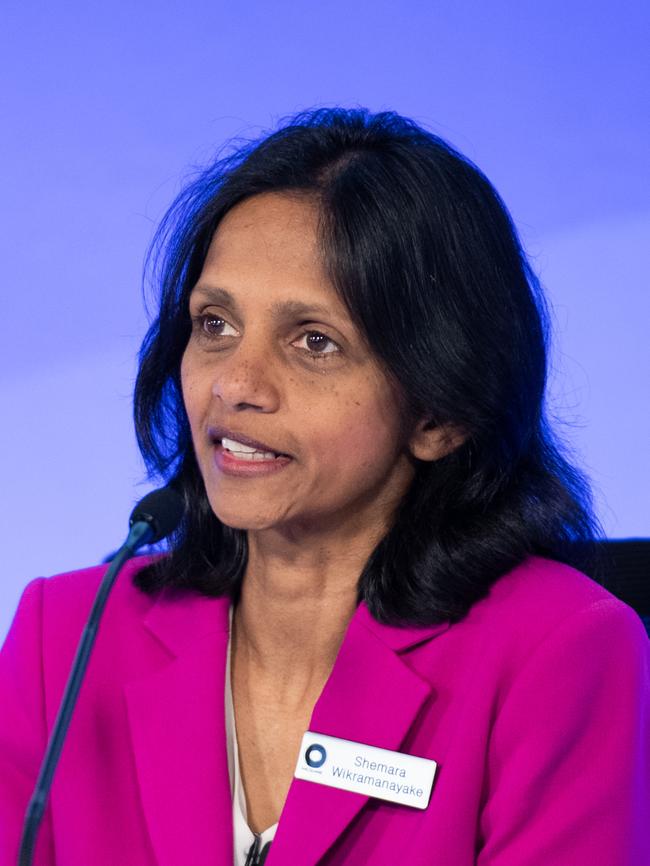
“The immediate response has been very good in terms of helping the economy and keeping it active through the pandemic but as we come out of this there’s going to be even more need for the government to bring capital to infrastructure projects to keep driving jobs and stimulate the economy.
Read the full story here.
Emily Ritchie 11.55am: Victoria’s CHO apologises to Afghan community
Victoria’s Cheif Health Officer has apologised to Victoria’s Afghan community after linking the spread of coronavirus in the city of Casey to some of its members.
“Members of the community might have felt singled out by statements I made recently,” Professor Brett Sutton told a press conference on Saturday.
“That was absolutely not my intention. So, sorry. It is a country I love and respect. I apologise.”
On Friday it was revealed an outbreak in Casey had been traced to five families that had broken social gathering rules.
The cluster in Casey has grown to 34 cases, with at least two people in hospital, but Professor Sutton said that outbreak is now under control.
He said the Victorian health team was not only combating the virus but also an alarming level of misinformation spreading through the community.
“There are many, many misconceptions out there and we have worked hard to find all of those channels to meet people where they are, as it were, and to make sure that the references to correct information keep bringing people back to what we know to be the truth,” Professor Sutton said.
“But there are some very persistent misconceptions and there are some people who are really trying to promulgate misinformation, disinformation, having false information out there for whatever reason, so we need to tackle that head-on as well.”
He said the most frustrating misconception was that “the coronavirus doesn’t exist and doesn’t kill people”.
READ MORE: New Melbourne cluster centres on five families
Emily Ritchie 11.40am: Numbers down but Premier digs in on roadmap
Despite cases in Victoria continuing to drop, Premier Daniel Andrews says it is not yet time to relax restrictions and his government will stay the course on his road map out of lockdown.
The Premier said he would not “get sidetracked by some of the loudest voices” and the downward trend proved his strategy was working.
“I think I would say to everyone watching and listening right now logic, commonsense, international our own experience shows us that you can’t hope to keep numbers low until you first get them low. That is just an undeniable fact,” Mr Andrews has told a press conference on Saturday.
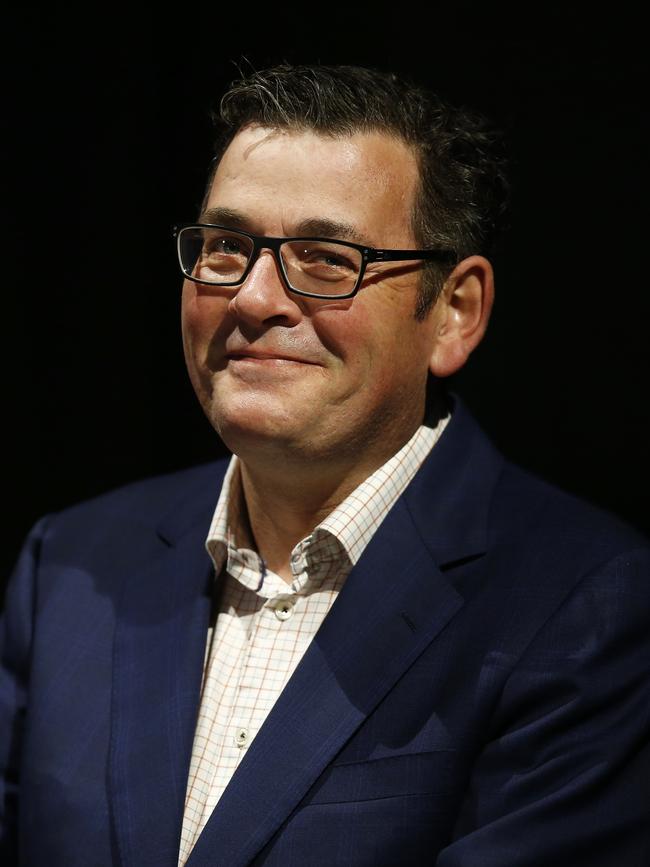
Victoria recorded its lowest daily case rate since June 24 on Saturday, with just 21 new cases, and also reported seven new deaths. This takes the state’s number of fatalities to 757, and there are now 834 active cases. The 14-day daily average for metropolitan Melbourne is now 39.3.
Victoria’s Chief Health Officer Brett Sutton said while the decrease in numbers was promising, there would be no change to the current roadmap out of lockdown.
READ MORE: Chris Kenny — Leaders’ grand deceit behind our climate of fear
Emily Ritchie 11am: NSW records three new virus cases
NSW has recorded three new cases of COVID-19 on Saturday.
Two of the new cases are returned travellers in hotel quarantine, and the third was locally acquired and under investigation.
The locally acquired case is someone who works at Concord Hospital, a location which has formed part of a cluster along with Liverpool Hospital.
The person, who cared for people with coronavirus, worked at the hospital while potentially infectious and contact tracing is underway to identify how the infection was acquired.
Three new cases of #COVID19 were diagnosed in the 24 hours to 8pm last night and one previously reported case has been excluded.
— NSW Health (@NSWHealth) September 19, 2020
Of the three new cases:
- 2 are returned overseas travellers in hotel quarantine
- 1 is locally acquired and under investigation pic.twitter.com/ptM0cPa9d0
NSW Health announced on Saturday a positive case reported in Murrumbidgee Local Health District on Thursday was a false positive and that case has been excluded from the official count.
“While the number of locally acquired cases recorded in the past 24 hours is low, the virus is likely circulating among people in the community with mild symptoms,” NSW Health said.
“As such, the risk of outbreaks and a resurgence of cases remains.”
READ MORE: Bernard Salt — Post-Covid, Australia will be born again
Christine Kellett 10.35am: Protesters promise rallies unlike any other
Anti-lockdown protesters are threatening to stage freedom rallies “like nothing you’ve ever seen before” in Melbourne’s CBD this weekend.
Scores of people were arrested last Sunday after a Freedom Day walk through Melbourne saw protesters clash again with Victoria Police at the Queen Victoria Market.
Pictures of riot police storming the market went around the world this week, with Premier Daniel Andrews making international headlines for enforcing the strictest lockdown measures since the pandemic began.

The state has recorded 21 new cases and seven more deaths overnight. The dip below 40 today of metropolitan Melbourne’s 14-day case average puts it on track to see an easing of restrictions. Premier Andrews is due to address the media at 11am.
- with NewsWire
READ MORE: Francis Galbally — Daniel Andrews should hang his head in shame
Rebecca Le May 10.15am: Queensland records no new cases of coronavirus
No new cases of COVID-19 have emerged in Queensland overnight, Premier Annastacia Palaszczuk confirmed in a tweet on Saturday.
The total number of cases stands at 1150 and there are 22 active cases in the state.
So far, only six people have died from the virus in Queensland, the last being an 83-year-old male cruise ship passenger on April 18.
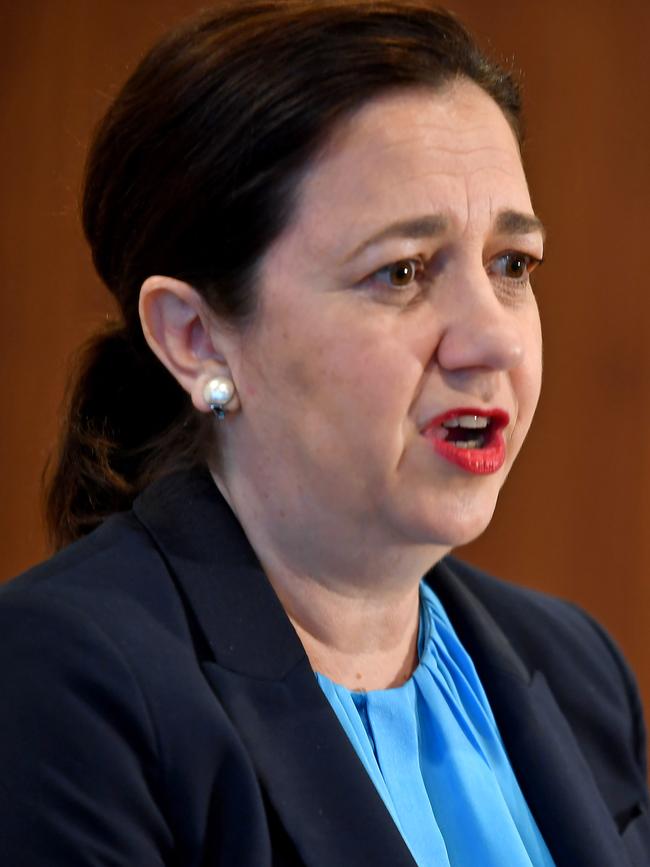
On Friday, the Queensland government announced it will accept travellers from Canberra from September 25 while the state will increase its weekly intake of returning Australians by 500 under a deal struck at a National Cabinet meeting.
Ms Palaszczuk floated the possibility of returning Australians serving their mandatory quarantine in regional centres.
Read the full story here.
Damon Kitney 9.50am: Crown execs strike it lucky on bonuses
The James Packer-backed Crown Resorts has moved to introduce clawback provisions on executive bonuses as part of a governance shake-up at the company, as it resolved not to pay any shortterm incentives for 2020 after its profits collapsed due to the COVID-19 pandemic.
Crown’s annual report, released on Friday, revealed it had introduced a plan where a component of the bonus payable to a senior executive is deferred for a year. The payment can then be forfeited if issues emerge that mean the bonus should not have been paid for that year.
The deferred component will be half the CEO’s bonus entitlement, and 25 per cent for the CEO of Australian Resorts.
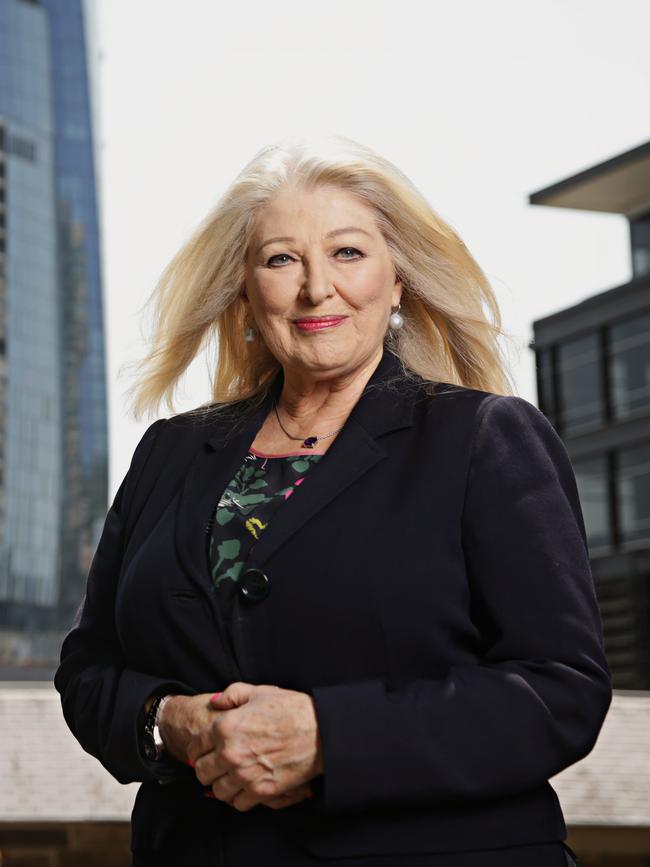
As part of a governance shakeup at the company, the executive chairman role was scrapped in January and in August Crown also appointed KPMG as its new auditor.
The company is currently the subject of an inquiry by the NSW Independent Liquor and Gaming Commission into its suitability to hold a casino licence in Sydney, following media allegations last year that the company worked with junket operators linked to organised crime and money laundering.
Read the full story here.
Christine Kellett 9.13am: Victorian cases drop to 21, seven deaths
New cases of coronavirus in Victoria have dropped to 21, with seven more deaths in the 24 hours to Saturday.
The rolling 14-day average has dipped to 39.3 in metropolitan Melbourne, compared to 1.9 in regional Victoria, according to the state’s Department of Health and Human Services.
The number of mystery cases is now 64.
#COVID19VicData: Yesterday there were 21 new cases reported and 7 lives lost. Our thoughts are with all affected. The 14 day rolling average & number of cases with unknown source is down from yesterday as we move toward COVID Normal.
— VicGovDHHS (@VicGovDHHS) September 18, 2020
Info: https://t.co/pcll7ySEgz #COVID19Vic pic.twitter.com/WE6gMJpEJ2
The drop in infections is the state’s lowest daily figure since June 23 where 18 cases were recorded.
The drop in average daily case number for metro Melbourne means the city is on track to a scheduled easing of restrictions.
Metropolitan Melbourne must reach an average daily case rate of between 30 and 50 cases over the preceding fortnight to trigger an easing of lockdown measures from September 28.
READ MORE: Gerard Henderson — Andrews in pursuit of liberty’s erosion
Amanda Hodge 9am: Thai PM raises Covid card at protest
Thai Prime Minister Prayuth Chan-o-cha has warned a planned Saturday rally by youth protesters demanding reform of the monarchy and military-drafted constitution will delay economic recovery in the tourist-reliant country and potentially spark a fresh wave of COVID-19 cases.
“When you gather in crowds you are creating an enormous risk of new infections. And with that you also create enormous risk to the livelihoods of tens of millions of fellow Thais,” the former junta leader said on Thursday.
“Any major flare-up of infections will lead to terrible consequences and even worse economic destruction, the likes of which we have never seen. Please think about this.”
Mr Prayuth said he had asked police to be “tolerant” of protesters — mostly university and high school students who have staged rallies across the country demanding a return to democracy, but also made clear they would be blamed for any fresh virus outbreak.

Thailand has paid a heavy price for its success in containing the coronavirus pandemic, with GDP down 12.2 per cent, year on year, in the second quarter — the country’s biggest economic contraction since the 1998 Asian financial crisis.
But critics say Mr Prayuth must shoulder some of the blame for the scale of Thailand’s economic woes for his failure since — first as leader of the junta which seized power in 2014 and then as civilian prime minister after winning what many saw as a stacked election in 2019 — to diversify the heavily tourism and export-dependent economy.
Read the full story here.
Geoff Chambers 8.45am: Stranded Australians ‘home by Christmas’
Scott Morrison wants 24,000 Australians stranded overseas to return home before Christmas after the national cabinet increased hotel quarantine places by 1600 a week and backed COVID-19 exemptions for citizens returning from New Zealand.
In the first step towards reopening international borders, commercial charter flights will be used to move returning residents across the country and emergency evacuations organised, if required, to support the return of up to 4000 vulnerable Australians.
With Victoria not accepting returning travellers, NSW, Queensland, Western Australia and South Australia have agreed to expand their hotel quarantine capacity with support from Australian Defence Force personnel.

National cabinet leaders also recommitted to easing COVID-19 restrictions and border closures, with Queensland, Tasmania and South Australia on Friday flagging a wider reopening of their economies over the next six weeks.
The Prime Minister said the national cabinet was moving to ensure the majority of stranded Australians could return home by the end of December, offering support on flights, accommodation and consular help.
Read the full story here.
Agencies 8.10am: Virus caseload surges past 30 million
Large parts of Europe are gearing up for broad new restrictions to stop the coronavirus, after infections worldwide topped 30 million and the World Health Organisation warned of “alarming rates of transmission”.
Britain is limiting gatherings and France is set to roll out new curbs for major cities as governments across the continent battle fresh spikes of the disease.
More than 944,600 people have now died from COVID-19 since it first emerged in China late last year, with Europe accounting for more than 200,000.
WHO regional director for Europe Hans Kluge said a surge this month “should serve as a wake-up call” after the continent recorded 54,000 infections in a single day last week, a new record.

“Although the numbers reflect more comprehensive testing, it also shows alarming rates of transmission across the region,” Mr Kluge said from Copenhagen.
The Spanish capital, Madrid, said it had been overwhelmed by the virus and called for “decisive” action from the central government, which is set to unveil a raft of new restrictions on Friday.
Read the full story here.
Agencies 7.40am: Trump vows vaccine for all Americans by April
US President Donald Trump expects enough COVID-19 vaccines “for every American” will be produced by next April, and that the first doses will be distributed immediately after approval later this year.
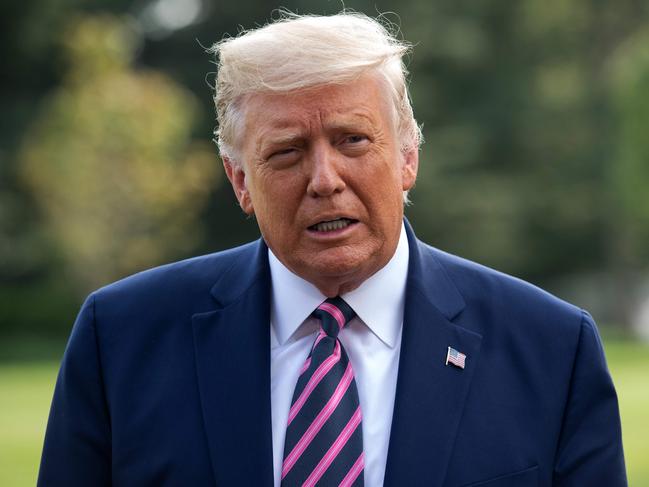
Claiming “historic progress” with three vaccines in the final stages of development and trials, Mr Trump said at least 100 million doses would be manufactured by the end of the year — perhaps more.
And he vowed to get the vaccine out with lightning speed, saying, “I think distribution will go even quicker than most people think.”
Vaccines are seen as one of the top methods for halting the spread of the coronavirus, which has killed nearly 950,000 people worldwide, including a global high of 198,000 in the United States.
Biden FAILED BADLY with the Swine Flu. It was the Gang That Couldn’t Shoot Straightâ€. He didn’t have a clue. We have done an incredible job with the much tougher China Virus!
— Donald J. Trump (@realDonaldTrump) September 18, 2020
The president, facing a tough reelection campaign, has repeatedly stated that he envisions a safe and effective vaccine approved in the coming weeks, even ahead of the November 3 presidential election. But that extraordinarily optimistic timeline was called into question by a top government health official this week.
Centers for Disease Control and Prevention director Robert Redfield testified to lawmakers Wednesday that a “very limited” distribution to priority groups, including first responders, could begin in November and December, but that full implementation would take many more months at least.
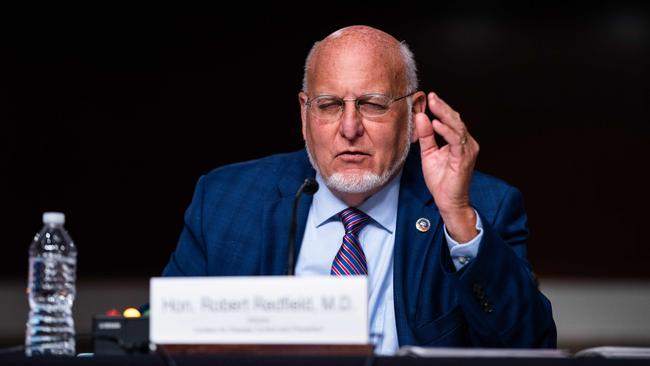
READ MORE: Greg Sheridan — Trump, Biden, Covid: all fault of West’s decadence
Mackenzie Scott 7.15am: Why Perth, Brisbane are pulling ahead in property
Perth and Brisbane are set to pull ahead of Sydney and Melbourne in the house price stakes as the economy gradually recovers from COVID-19.
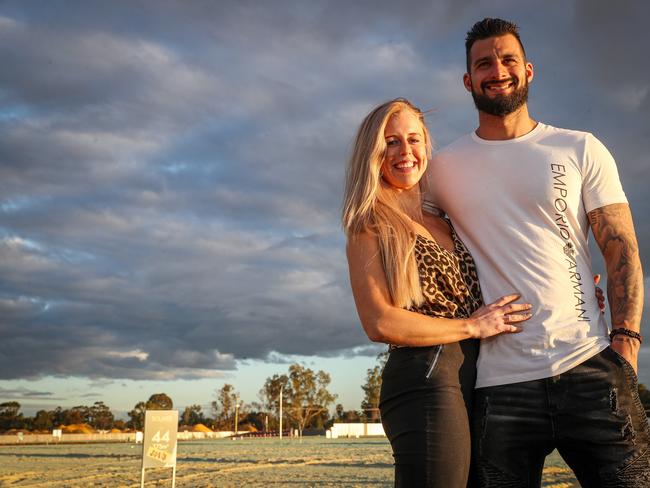
A two-speed market is likely to emerge as the smaller capitals leverage their affordability and relatively stable economies — well insulated against the pandemic-inspired downturn — to bounce back.
Westpac data suggests several capital city property markets will be more resilient than initially thought, but Sydney and Melbourne – which represent about 40 per cent of Australia’s housing market — will be hit hard.
Between April and June next year, Melbourne is forecast to plunge 12 per cent, while Sydney is expected to fall 5 per cent. At the same time, Brisbane is expected to dip just 2 per cent, while Perth remains unchanged.
Read the full story here.
Olivia Caisley 6.45am: ADF stands by offer to help quarantine security
The Australian Defence Force says Victoria was offered help with hotel quarantine the day before the disastrous program began, directly contradicting repeated claims to the contrary by Daniel Andrews and the state’s top emergency official.

The ADF said state authorities offered support on March 28, rejecting a statement made by Emergency Management Victoria Commissioner Andrew Crisp that has been heavily relied on by the Victorian Premier since he told a parliamentary inquiry it was “fundamentally incorrect” to assert there were “hundreds of ADF staff on offer and somehow someone said no”.
It comes as mounting evidence of the ADF’s willingness to assist the state emerges from the hotel quarantine inquiry, with counsel assisting Rachel Ellyard saying on Friday that Victorian authorities understood there was the potential access to ADF help.
Read the full story, by Olivia Caisley and Remy Varga, here.
Glenda Korporaal 6.30am: ‘Canberra must hedge bets on coronavirus vaccine’
Bianca Ogden — a virologist turned stockpicker — has urged the Morrison government to look at deals with COVID vaccine makers other than just AstraZeneca and the University of Queensland.
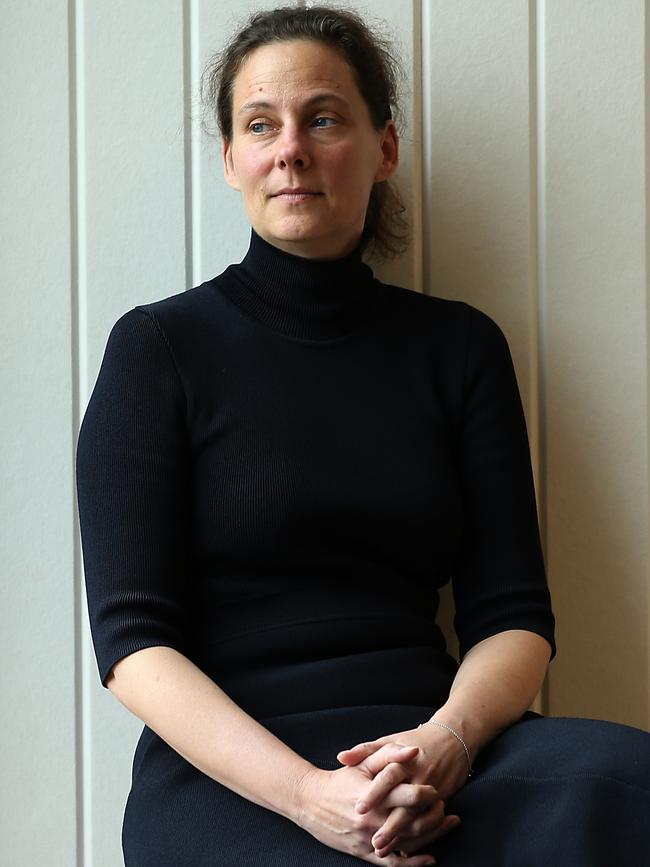
The German-born Ms Ogden, who now runs Platinum Asset Management’s $350m healthcare fund, said the government should diversify its exposure to different vaccine makers.
“I wish the government would be more open to other potential vaccines and hedge their bets as we have seen with other governments,” she told The Weekend Australian.
She said questions that recently emerged with the AstraZeneca-backed research being done by Oxford University highlighted the risks of backing just one or two researchers.
“You always want to hedge your bets,” she said.
Read the full story here.
Natasha Robinson 6.15am: Doctors push for telehealth to be made permanent
Doctors have welcomed the government’s move to extend Medicare-subsidised telehealth for another six months under a $2bn COVID-19 health package, but are calling for urgent planning to make the measure permanent.

The Australian Medical Association said the next six months should be used to plan how to “finalise the future of telehealth in Australia”, with the measure having become so popular that it would be inconceivable to wind back the remote provision of medicine.
Between March and September 15, the telehealth program provided more than 30 million services to more than 10 million patients, with $1.55bn paid out in health benefits.
The telehealth extension will run until March 31 and allows Medicare-billed phone or video consultations with GPs, nurses, midwives and allied and mental health professionals.
The measure is part of a wider COVID-19 federal government health package that includes the purchase of extra personal protective equipment for the National Medical Stockpile, the funding of 148 GP-led respiratory clinics, free COVID-19 pathology tests and extra funding for hospitals.
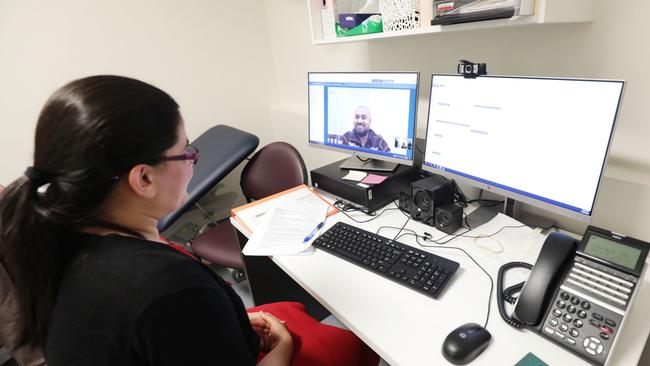
Read the full story here.
Rebecca Urban 5.30am: New Melbourne cluster centres on five families
Members of five Melbourne households who visited each other’s homes in potential breach of the city’s lockdown rules are at the root of a fresh coronavirus outbreak that has threatened the state’s bid to defeat its second wave.
Thirty-four people who live in Melbourne’s southeast have tested positive for COVID-19, with two understood to be undergoing treatment in hospital. Transmission occurred through household mingling, it emerged on Friday.
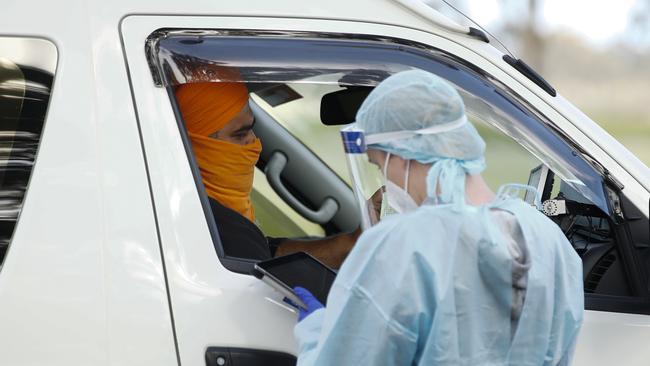
Health authorities revealed that they were forced to involve Victoria Police in a “painstaking” contact-tracing process, which proved challenging as links between the cases were not immediately obvious. None of those involved has been fined.
Premier Daniel Andrews described the outbreak, which Victoria’s Chief Health Officer Brett Sutton had linked to the Afghan community, as “disappointing”.
The cluster, which covers households in Hallam, Clyde, Narre Warren South and Cranbourne North, is among 90 active cases in the municipalities of Casey and Dandenong, where health authorities have rolled out four new testing sites in a bid to bring the outbreak under control.
Read the full story here.
Staff writers 5.15am: People with one blood type at less risk from virus
A new study of more than one million people suggests those with a certain blood type are less at risk of contracting COVID-19 than others.

The research into 1.05 million participants over four months, published on medrxiv.org has found people with O-type blood may be less susceptible to contracting coronavirus.
The results have not been peer reviewed and are based on research results from personal genomics and biotechnology company 23andMe, who conducted the COVID-19 study this year.
It shows people with O-type blood appear to be at a lower risk of being infected and also are less likely to have a severe case of the disease.
Read the full story here.
Lisa Mayoh 5am: Fears pandemic, isolation fuelling eating disorders
The coronavirus pandemic and isolation are fuelling eating disorders, as anorexia sufferers battle social media messaging about body image and “dangerous’’ memes showing people gaining weight during lockdown.

The recent death of 33-year-old eating-disorder sufferer Jaimi Kenny, daughter of Olympians Lisa Curry and Grant Kenny, has reignited a conversation about the dangers of the illness, which has had a huge spike recently.
Eating Disorders Victoria has reported a 30 per cent increase in calls to its helpline. Chief executive Belinda Caldwell said services had been increased to serve demand, with 10 support groups a month now, up from just three.
Read the full story here.




To join the conversation, please log in. Don't have an account? Register
Join the conversation, you are commenting as Logout